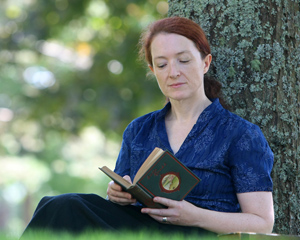 |
| Julia Wright explores the literature of 19th century Ireland (Nick Pearce photo) |
A lost country. Accusations of treason. Whispers of dissent.
If the history of Ireland has always been a bit complicated, the turn of the 19th century was a particularly troublesome era. The tensions that led up to the Act of Union in 1800 â which eliminated the Irish Parliament and established the United Kingdom of Great Britain and Ireland â were hot topics of debate in the letters and literature of the time, as Julia Wright explains.
âOne of the reasons why Ireland is so fascinating is that itâs part of a European discussion of culture and politics, but at the same time was treated as a colony of Britain,â says Dr. Wright, the Canada Research Chair in European Studies. âIt did not have sovereignty, in the sense of control within its own borders, but its writers were influential in Britain and continental Europe.â
Currently, Dr. Wright is working on two book projects, supported by a recent grant from the Social Sciences and Humanities Research Council and connected under the banner âNational Insurgencies: Stateless Soldiers and the Mob.â The first part of the project â the âstateless soldiersâ â refers to a generation of Irish leaders who were left without a legislature after the Act of Union in 1800.
âThese are the men who would have entered the Irish parliament, and now that parliament is gone,â she says. âTheyâre represented in novels and poems of the time as men with great leadership skills and a sense of heroism and civic duty, but left quite aimless and without purpose.â
Ìı
Her book-in-progress explores how the literature of the time â such as Lady Sydney Morganâs novel The OâBriens and the OâFlahertys â expressed these ideas. They speak to a nation that has been lost, and leaders for whom the only opportunity left is to join foreign armies, usually in continental Europe
Dr. Wrightâs other project discusses a particular paranoia of the same time period: a tendency to represent dissent as a larger conspiracy against the state. Using cultural materials ranging from novels and poems to trial accounts and letters, she is tracking the evolution of this thought. This was, after, all, the era of the British Treason Act of 1795, making it illegal for groups to get together and talk politics.
âThere were moments during this period where they charged people for treason merely for toasting Ireland over a drink,â explains Dr. Wright. âIn the years immediately after the French Revolution, this dissent was also framed in terms of religion: a Catholic conspiracy. Thereâs this fear of the masses throughout the late 19th century and itâs played through the literature with motifs such as the âforeign spyâ and the domestic traitor becoming popular.â
Suspicions ran so high that even famous authors fretted about being under surveillance.ÌıIn one hilarious anecdote, the poets Wordsworth and Coleridgeâs discussion of philosopher Spinoza led to a report to London that they had been overheard talking about their friend, âSpy Nosy.â
